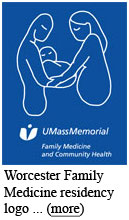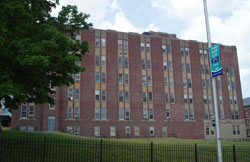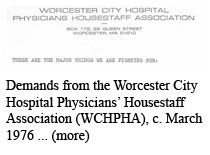Prologue
In 1974, the University of Massachusetts Medical School established the first Family Medicine residency in New England. Within five
 years, the residency had expanded from one to four different sites, three of which were designated the "Worcester"
program and the
fourth, the "Fitchburg" program, but all accredited through UMass Medical School in Worcester. The following history is designed to
retrieve the signature values that informed the creation of this distinctive program in Massachusetts during the 1970s and '80s through
written and audio text, photographs, and documents.
years, the residency had expanded from one to four different sites, three of which were designated the "Worcester"
program and the
fourth, the "Fitchburg" program, but all accredited through UMass Medical School in Worcester. The following history is designed to
retrieve the signature values that informed the creation of this distinctive program in Massachusetts during the 1970s and '80s through
written and audio text, photographs, and documents.
In 2008, Worcester Family Medicine residents held a contest to design a new logo for their program.
The winning design captures some of the core values of Family Medicine: a family—parents and a newborn—are shown joining
together in a
warm and understanding bond. They could be anyone, from any walk of life, neighborhood, or culture. The specialty of Family Medicine has
long championed the primacy of positive human relationships for good health and for good health care. Focusing on the health of
families and the centrality of the patient-physician relationship for empathic care giving, it champions the right of all humans to basic health
care and the role of family physicians in the health of communities. These values have deep roots in the family practice movement of the
1960s and 1970s; at UMass they were present from the beginnings of the program in 1974. The following exploration of the program's early
history will, it is hoped, open a window onto the origins of these ideas and their legacy for today's family physicians.
Introduction
 In 1976, Worcester citizens reading the morning Telegram or the
Evening Gazette would have seen some unusual items of news. The
interns and residents (or, house staff) of the municipally owned Worcester City Hospital, having documented the hospital's shockingly
deteriorated conditions, were now threatening to strike. Immediately these young physicians found themselves accused by the senior
medical staff of acting out of nothing but self-interest and greed.(1) The house staff, however, could count on the
highly visible support
of their neighbors living in Worcester's "Main South," the poorest area in Worcester and the source of most of the hospital's patients.
In 1976, Worcester citizens reading the morning Telegram or the
Evening Gazette would have seen some unusual items of news. The
interns and residents (or, house staff) of the municipally owned Worcester City Hospital, having documented the hospital's shockingly
deteriorated conditions, were now threatening to strike. Immediately these young physicians found themselves accused by the senior
medical staff of acting out of nothing but self-interest and greed.(1) The house staff, however, could count on the
highly visible support
of their neighbors living in Worcester's "Main South," the poorest area in Worcester and the source of most of the hospital's patients.
 Many in the neighborhood were Puerto Ricans who had moved to the city only in the past decade looking for work. They depended on City
Hospital.(2) When the City Hospital residents' demands became
public knowledge, some of their patients promptly called a public meeting
Many in the neighborhood were Puerto Ricans who had moved to the city only in the past decade looking for work. They depended on City
Hospital.(2) When the City Hospital residents' demands became
public knowledge, some of their patients promptly called a public meeting
 of a new organization called the Committee for Organizing the Puerto
Rican Community. With newspaper reporters in attendance, both house
staff and local citizens aired their grievances and fears, making sure City Hall heard from voices other than the hospital's senior
physicians. Soon another citizens' group was formed to lobby for the house staff's demands: the Community Coalition for a Better City
Hospital. The house staff, meanwhile, formed a union. Their campaign to reform City Hospital lasted for two years.
of a new organization called the Committee for Organizing the Puerto
Rican Community. With newspaper reporters in attendance, both house
staff and local citizens aired their grievances and fears, making sure City Hall heard from voices other than the hospital's senior
physicians. Soon another citizens' group was formed to lobby for the house staff's demands: the Community Coalition for a Better City
Hospital. The house staff, meanwhile, formed a union. Their campaign to reform City Hospital lasted for two years.
Interns and residents from several medical specialties at Worcester City Hospital played an important role in the struggles of 1976-1978. But, with few exceptions, the most prominent protestors represented the newest specialty in the profession: Family Medicine. In fact, when Hospital leaders eventually retaliated against the perceived "troublemakers," Family Medicine residents received the brunt of their displeasure. How did such a young specialty—founded in 1969 and only established at UMass Medical School in 1974, two years before the protest—come to play such an active and highly public role in the politics of urban health care in Worcester? What could account for these doctors' unusual esprit de corps? In this exhibit, we will try to answer these questions by describing the unique mission of Family Medicine in the 1960s and 1970s and its early history in central Massachusetts and at the University of Massachusetts Medical School. We'll begin with the creation of Family Medicine as a distinct and unusually "countercultural" field, move on to the program at UMMS and its four earliest residency teaching sites, and finally look at the protests of 1976-1978.
